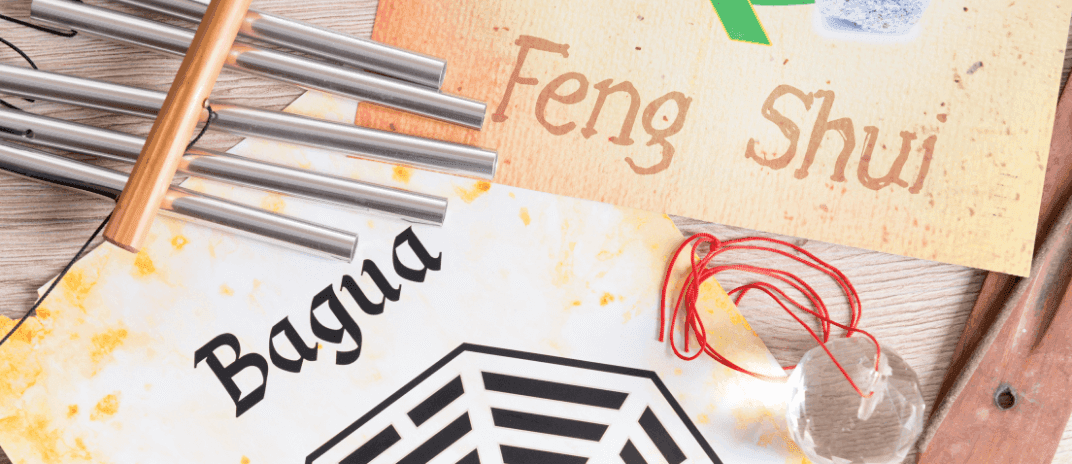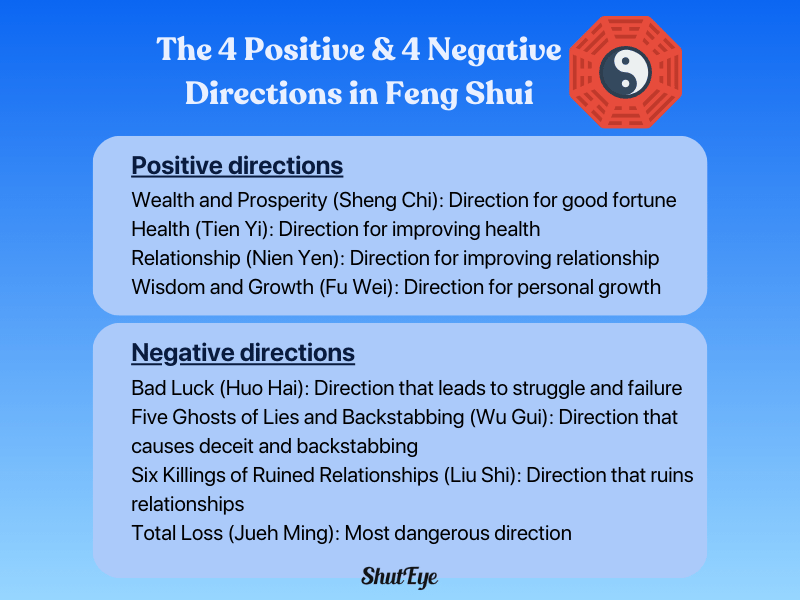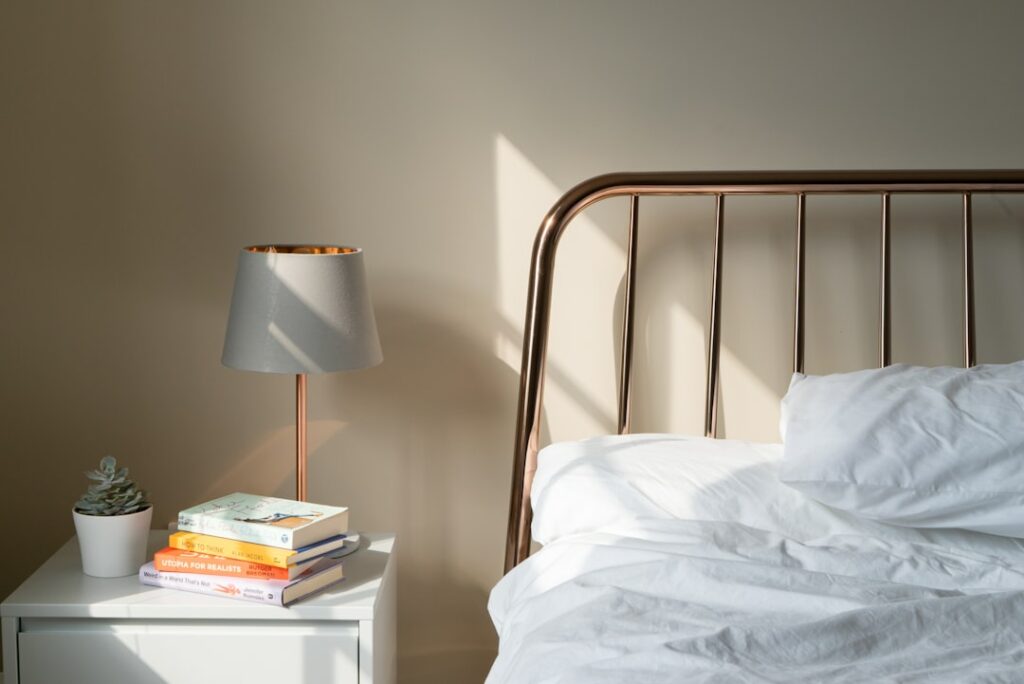


Do you struggle to sleep well at night, tossing and turning in search of rest? Discover how your feng shui sleeping head direction matters for optimal rest.
By aligning your sleep direction correctly, you can enhance your sleep quality, promote positive energy, and improve your overall well-being.

Feng Shui is an ancient Chinese practice that involves the arrangement of objects, buildings or space in a specific manner to achieve balance and harmony. It stems primarily from the Taoist belief in Chi, a life force that is made up of yin and yang elements.
It is believed by many Chinese people that Feng Shui in daily life can help to improve this Chi and bring good health, good luck, and improve relationships [1]. Thus, it is also commonly used in the arrangement of the bedroom space, bed placement, and determining the direction you should sleep in at night.
In feng shui, the 8 Mansions theory is used to determine your personal kua number and to identify your good direction and bad directions in life. To find your kua number, you’ll have to check your birthdate against the lunar calendar [2]. Once you’ve found your Chinese year of birth, add the last two digits of your birth year, reduce it to a single digit, and subtract from 10 if you’re male, or add 5 if you’re female.
Example for Males:
So, for a male born in 1966, your personal kua number is 7.
Example for Females:
For a female born in 1966, your kua number is 8.
By following this simple calculation, you can identify your good and bad compass directions for the different aspects of your life. This calculation also serves as a foundation for aligning your bed in the most beneficial sleep position to enhance energy flow, promote restful sleep, and invite positive energy into your space.
Once you have calculated and found your Kua number (see previous section), it is now time to determine the best compass direction for you to sleep in. Each kua number has 4 positive directions and 4 negative directions [3].
The 4 positive directions are:
The 4 negative directions are:

For you to maximize the benefits, you want to ensure that you are positioning the crown of your head in a positive direction. Following this feng shui alignment may potentially enhance the energy flow in your bedroom, promoting a good night’s sleep and better overall well-being.
Here is a table of all the Kua numbers and the good and bad directions for reference.
| Kua Number | Good Directions | Bad Directions |
| 1 | South East (Wealth), East (Health), South (Relationships), North (Wisdom) | West (Bad Luck), North East (Five Ghosts), North West (Six Killings), South West (Total Loss) |
| 2 | North East (Wealth), West (Health), North West (Relationships), South West (Wisdom) | East (Bad Luck), South East (Five Ghosts), South (Six Killings), North (Total Loss) |
| 3 | South (Wealth), North (Health), South East (Relationships), East (Wisdom) | South West (Bad Luck), North West (Five Ghosts), North East (Six Killings), West (Total Loss) |
| 4 | North (Wealth), South (Health), East (Relationships), South East (Wisdom) | North West (Bad Luck), South West (Five Ghosts), West (Six Killings), North East (Total Loss) |
| 5 | North East (Wealth), West (Health), North West (Relationships), South West (Wisdom) | East (Bad Luck), South East (Five Ghosts), South (Six Killings), North (Total Loss) |
| 6 | West (Wealth), North East (Health), North East (Relationships), North East (Wisdom) | South East (Bad Luck), East (Five Ghosts), North (Six Killings), South (Total Loss) |
| 7 | North West (Wealth), South West (Health), North West (Relationships), West (Wisdom) | North (Bad Luck), South (Five Ghosts), South East (Six Killings), East (Total Loss) |
| 8 | South West (Wealth), North West (Health), West (Relationships), North East (Wisdom) | South (Bad Luck), North (Five Ghosts), East (Six Killings), South East (Total Loss) |
| 9 | East (Wealth), South East (Health), North (Relationships), South (Wisdom) | North East (Bad Luck), West (Five Ghosts), South West (Six Killings), North West (Total Loss) |
In Feng Shui, sleeping with your head facing north is generally considered the worst position to sleep in. The north direction is believed to cause negative energy flow, cause restlessness, and lead to an increased risk of health problems. However, this is also dependent on your Kua number as it could be a good direction for some.

Determining your best sleep direction involves considering various factors beyond just your Kua number. Apart from your Kua number, personal comfort, room layout, ventilation, exterior factors like windows, bedroom location, and personal goals also play a crucial role in deciding the best sleeping direction for you.
To ensure a balanced approach, take into account your partner’s needs and preferences, align your bed with the interior decor scheme, follow feng shui principles, and work with unchangeable room aspects.
Prioritize your well-being and comfort when finalizing the direction to enhance your sleep quality and overall energy flow in your sleep environment.
To ensure a balanced approach to achieving bedroom harmony and balance, you should prioritize personal comfort when considering the optimal Feng Shui sleeping direction. Here’s why personal comfort is crucial:
Physical Comfort:
Emotional Comfort:
When seeking guidance on optimal Feng Shui sleeping direction, consulting feng shui practitioners can provide valuable insights and solutions tailored to your specific needs and concerns. Feng Shui experts offer balanced designs and can help address any sleeping position issues you may have.
Before hiring a consultant, it’s important to check their pricing and evaluate their styles to find the best fit for you. References can also help gauge the expertise of different experts.
In conclusion, by aligning your bed in the optimal Feng Shui sleep direction based on your Kua number, you can improve your sleep quality and everyday life. Each Kua number has its own set of good and bad directions. If you plan to follow feng shui for your sleep, it’s important to take note of this.
Alternatively, you may also achieve better sleep quality with the ShutEye® app. ShutEye is a highly trusted sleep-tracking app that monitors your sleep cycle and offers tips to improve your sleep hygiene. Try it now!
8Treasures (n.d.) The 8 Mansions Theory [online]. Available at: https://8treasures.biz/the-8-mansions-theory/
Oon, M. (2024) Feng Shui Bed Directions [online]. Available at: https://michaeloon.com/blog/feng-shui-bed-directions/
National Geographic (2023) Feng Shui [online]. Available at: https://education.nationalgeographic.org/resource/feng-shui/